How King Charles is helping to ‘reinvigorate’ the shaken UK-France friendship
8 minutes ago
 Paul KirbyEurope digital editor
Paul KirbyEurope digital editor

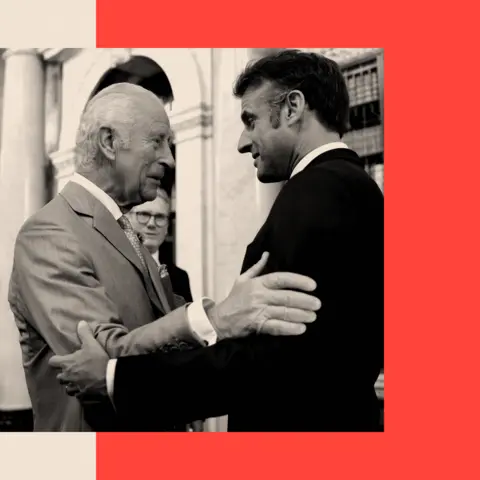 BBC
BBCFew scenes convey British pomp and soft power more than the King and Queen in a carriage procession through the picturesque streets of Windsor. They are being joined on Tuesday by Emmanuel and Brigitte Macron for the first state visit by a French president since 2008, and the first by a European Union leader since Brexit.
The Prince and Princess of Wales will be there too — a Royal Salute will be fired and Macron will inspect a guard of honour. But at a time of jeopardy in Europe, this three-day visit to Windsor and London promises much more than ceremony.
There is a genuine hope that the coming days will make a difference to both countries.

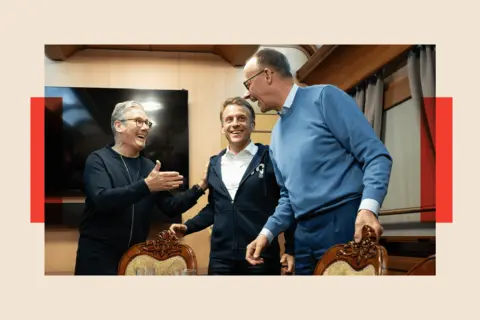 Getty Images
Getty ImagesMacron will address MPs and peers at Westminster, and he and Brigitte will be treated to a state banquet back at Windsor. The trip will culminate with a UK-France summit, co-chaired by Sir Keir Starmer and Macron, during which the two governments hope to reach an agreement on the return of irregular migrants.
They will also host Ukraine’s leader by video as they try to maintain arms supplies to his military.
But the wider question is how closely aligned they can really become, and whether they can put any lingering mistrust after Brexit behind them.
And, given that the trip will involve much pageantry — with the tour moving from the streets of Windsor, the quadrangle of the Castle and later to the Royal Gallery of the Palace of Westminster — how crucial is King Charles III’s role in this diplomacy?
Resetting a ‘unique partnership’
It was less than two months ago that the UK and EU agreed to “reset” relations in London. Ties with France in particular had warmed considerably, driven partly by personal understanding but also strategic necessity.
The two neighbours have much in common: they are both nuclear powers and members of the United Nations Security Council.
They are also both looking to update a 15-year-old defence pact known as the Lancaster House treaties, which established a 10,000-strong Combined Joint Expeditionary Force (CJEF), and they have recently been working on broadening it to include other Nato and European countries.

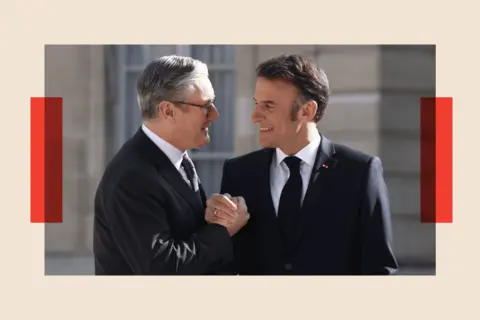 Getty Images
Getty Images“It has always been a unique partnership,” says former French ambassador to the UK Sylvie Bermann. “I think this partnership will be crucial in the future.”
All of this is unlikely to escape the notice of US President Donald Trump, who is also promised a state visit, his second to the UK, probably in September.
King Charles is ‘more than a figurehead’
King Charles, who is 76, has already navigated some complex royal diplomacy this year.
Macron was the first European leader to visit Trump in the White House in February, but it was Sir Keir who stole the show days later, handing him a personal invitation from the King.
Then, when Ukraine’s President Volodymyr Zelensky returned to Europe fresh from a bruising meeting with Trump at the White House in February, it was King Charles who welcomed him to Sandringham, and then met him again at Windsor in June.
He has spoken in the past of the heroism of Ukrainians in the face of “indescribable aggression”.
Even before ascending the throne, King Charles amassed decades of experience in international affairs (he is also fluent in French). He was only 21 when he attended the funeral in 1970 of Charles de Gaulle, the wartime general who became the architect of France’s current Fifth Republic.
He went on to become the longest-serving Prince of Wales in history, and now he is King he has weekly audiences with the prime minister. “The choreography is a strange dance, I suspect, between Number Ten and the Palace,” says royal commentator Richard Fitzwilliams.
“There’s no doubt at all that Charles is considerably more than a figurehead.”

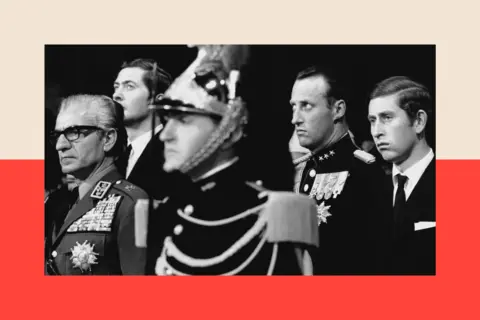 Getty Images
Getty ImagesWindsor Castle, which dates back to the first Norman king, William the Conqueror, has hosted French presidents before. But there is a quiet significance in the appearance of the Prince and Princess of Wales in welcoming Emmanuel and Brigitte Macron, as Catherine recovers from treatment for cancer.
Between them, the King and Macron have played their part in resetting relations between the two neighbours, and by extension with the European Union too.
The King is a francophile, says Marc Roche, a columnist and royal commentator for French media: “He has always had a good relationship with France.”
A year after the death of Queen Elizabeth II, it was France that King Charles and Queen Camilla chose for their first state visit in September 2023.

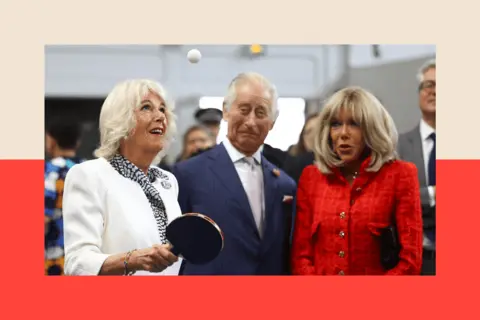 AFP via Getty Images
AFP via Getty ImagesMacron had reminded the world in 2022 that the late Queen had “climbed the stairs of the Élysée Palace” six times — more than any other foreign sovereign. His words were warmly received in the UK.
The King received a standing ovation after an address in French to the Senate, and the Queen played table tennis at a sports centre with Brigitte Macron. France’s first lady has since visited her in London for a cross-Channel book award.
Gentle touches they may have been, but it followed a very rough period in Franco-British relations.
Brexit negotiations soured relations
The mood had soured during negotiations over Brexit, which the French president said was based on a lie.
Then four years ago, Australia pulled out of a deal to buy 12 French submarines and signed a defence pact with the UK and US instead. The French foreign minister called it a “stab in the back”.
Boris Johnson, who was prime minister at the time, told the French they should “prenez un grip” and “donnez-moi un break”.

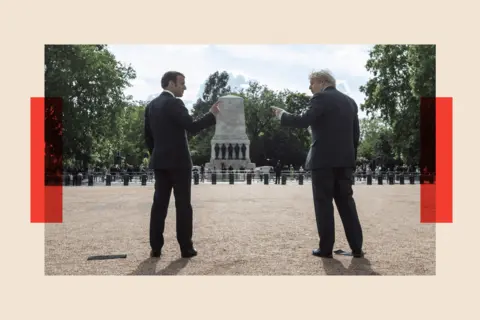 Getty Images
Getty ImagesIt had been Macron’s idea for a European Political Community (EPC) in 2022 that brought the UK into a broad group of countries all seeking to respond to Russia’s full-scale invasion.
In 2023 the then-Prime Minister, Rishi Sunak, sought to turn the page on several years of frosty relations at a Franco-British summit in Paris.
British and French prime ministers have come and gone: the UK had three in 2022, and last year France had four. It was Sunak’s team that organised last year’s EPC summit at Blenheim, but it was Starmer as new prime minister who chaired it.
Sébastien Maillard, who helped advise the French presidency in setting up the EPC, said he believed “on both sides there is still a lack of trust… The memory of these difficult times has not vanished”.
“Trust needs time to build and perhaps the Russian threat, support for Ukraine and how to handle Trump are three compelling reasons to rebuild that trust,” says Maillard, who is now at the Chatham House think tank.
More from InDepth
Susi Dennison, of the European Council on Foreign Relations in Paris, agrees relations with France are not back to pre-Brexit levels, but suggests some things the UK and France are “bickering” about were being argued over even before the Brexit vote.
For Macron, this is a chance to not only improve the relationship but also to shine on the international stage when his popularity at home has sunk, Mr Roche believes. “It’s a very important visit, especially the first day, because the French are fascinated by the Royal Family.”
After eight years in power, Macron’s second term still has almost two years to run, but he has paid the price politically for calling snap elections last year and losing his government’s majority. His prime minister, François Bayrou, faces a monumental task in the coming months in steering next year’s budget past France’s left-wing and far-right parties.
As president, Macron’s powers – his domaine réservé – cover foreign policy, defence and security, but traditionally France’s prime minister does not travel with the head of state, so Macron comes to the UK with a team of ministers who will handle far more than international affairs.
The difficult question of migration
During the summit, the two teams will also work on nuclear energy, artificial intelligence and cultural ties. Differences still have to be sorted over “post-Brexit mobility” for students and other young people, and France is expected to push the Starmer government on that.
But most of the headlines on Thursday’s UK-France summit will cover the two main issues: defence and migration.
Defending Ukraine will take pride of place. An Élysée Palace source said it would discuss “how to seriously maintain Ukraine’s combat capability” and regenerate its military.
“On defence our relationship is closer than any other countries,” says former ambassador Sylvie Bermann. “We have to prepare for the future… to strengthen the deterrence of Europe.”
And if a ceasefire were agreed in Ukraine, the two countries could provide the backbone of the “reassurance force” being proposed by the “coalition of the willing”. Sir Keir and Macron have played a prominent part in forming this coalition, but so too have the military chiefs of staff of both countries.
Migration is the stickiest problem the two countries face, however. How they deal with their differences on it — particularly on small boats — is crucial to their future relationship.
They are especially keen to sign an agreement on migrant returns and on French police stopping people boarding “taxi boats” to cross the Channel.

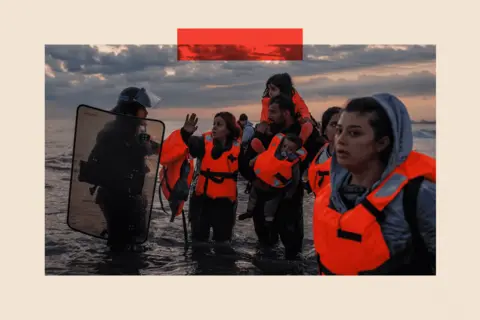 Getty Images
Getty ImagesFrance has long argued that the UK has to address the “pull factors” that drive people to want to risk their lives on the boats — the UK, for its part, already pays for many of the 1,200 French gendarmes to patrol France’s long northern coastline to stop the smugglers’ boats.
The countries are believed to have been working on the terms of a “one-in, one-out” agreement, so that for every small-boat arrival in the UK that France takes back, the UK would allow in one asylum seeker from France seeking family reunification.
Several countries on the southern coasts of Europe are unimpressed because it could mean France sending those asylum seekers handed back by the UK on to their country of entry into the EU, bordering the Mediterranean.
In the UK, the opposition Conservatives have branded the idea “pathetic”, accusing the government of a “national record – for failure” on curbing small-boat crossings.
And yet every country in Europe is looking for a way to cut illegal border crossings. Meghan Benton, of the Migration Policy Institute, believes a Franco-British deal could work as a possible pilot for the rest of Europe: “What works for the Channel could also work for the Mediterranean.”

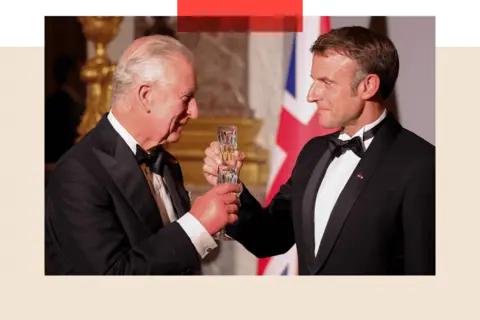 Getty Images
Getty ImagesAny agreement on this tricky issue could also signal a real, practical improvement in the countries’ political relationship. France’s right-wing Interior Minister, Bruno Retailleau, has already been working with Labour’s Home Secretary Yvette Cooper to try to find a workable solution.
How far they get, and its wider impact on Europe, is still to be decided, but it does reflect a new willingness between the two neighbours to tackle the divisions between them.
Boris Johnson once accused France of wanting to punish the UK for Brexit. That difficult chapter appears to be over.
As Susi Dennison puts it: “There’s a certain distance that will always be there, but things are operating quite well.”
During King Charles’ 2023 state visit to France he called on the two countries to find common ground, “to reinvigorate our friendship to ensure it is fit for the challenge of this, the 21st Century”.
And so this visit will help show — both in the relationships between individuals and on concrete policy debates — whether his call has been answered.
BBC InDepth is the home on the website and app for the best analysis, with fresh perspectives that challenge assumptions and deep reporting on the biggest issues of the day. And we showcase thought-provoking content from across BBC Sounds and iPlayer too. You can send us your feedback on the InDepth section by clicking on the button below.